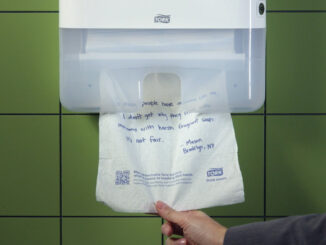Amid concerning hand hygiene compliance rates, healthcare professionals are turning to immersive VR training to foster better habits and protect patients
Essity is supporting this year’s World Hand Hygiene Day with a series of interactive and immersive hand hygiene trainings. These are designed to help healthcare professionals effectively implement hygiene practices and improve adherence to the WHO’s 5 moments of hand hygiene.
“Healthcare professionals are exposed to pathogens frequently throughout the day – whether through close contact with patients or interaction with high touch surfaces such as doorknobs, bedrails, or patient bathrooms,” said Essity’s Sales Manager Professional Hygiene Liam Mynes.
“While the importance of hand hygiene is widely understood among healthcare providers, following hand hygiene best practices can be challenging. There is a growing need to empower effective implementation of sustainable, accessible and scalable hygiene procedures.”
Tork Virtual Reality (VR) Clean Hands Training and Education is designed to make hand hygiene training more engaging and effective to drive behavioural change and accelerate deeper learning.
The training invites users into a digital world where they are confronted with a series of scenarios in which hand hygiene needs to be carried out. Trainees take on the role of a nurse, carer or doctor where they are tasked with caring for several patients. The trainee’s results are then assessed on how far they comply with the World Health Organisation’s 5 Moments for Hand Hygiene.
“According to research we only remember 10 per cent of what we read, 20 per cent of what we hear and 30 per cent of what we see,” said Liam. “However, when simulating an action as one does as a part of VR we remember as much as 90 per cent.”
This is the ninth consecutive year that Tork will be participating in World Hand Hygiene Day, an initiative run by the Private Organizations for Patient Safety and facilitated by the World Health Organization.
“To improve hand hygiene practices, it’s important for employees to have access to consistent, hands-on training that easily transfers to their day-to-day workflows,” said Dr Claire Kilpatrick, Director of KS Healthcare Consulting.
“Sharing hand hygiene knowledge is important because hand hygiene is one of the most effective ways to keep people safe from infection, help people understand when and how to perform hand hygiene, and achieve public health targets in a cost-effective way. When the 65 million healthcare workers around the globe train and act on hand hygiene they help save lives – yours, a loved one’s and those most vulnerable in society.”



Be the first to comment